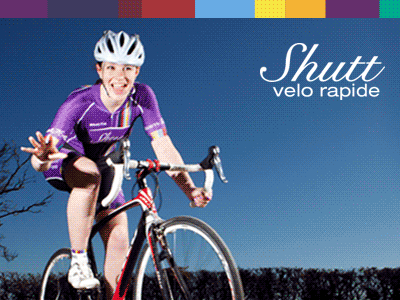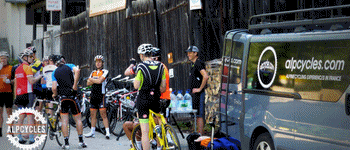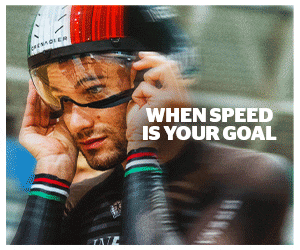Madison Genesis chat to Roger Hammond who returns to the team after a spell at Dimension Data –
 |
Feature: Roger Hammond Back at Madison Genesis
From Madison Genesis – click to go to the website
Q: In six years you’ve gone from pro rider, to your first DS role with Madison Genesis, to being DS for Dimension Data and Mark Cavendish at the Tour de France and now you return to Madison Genesis. How much have you learned from that first season to now?
Roger: I do feel like I’m in a better position. When I started with Madison Genesis for the first time in 2013, I had only retired from pro racing for a few months. Like I always said, I felt like a newbie and I was. As a rider, all I used to get was an email telling me where to be and that was it. The rest was done for me. I didn’t even have to wash my shoes, it was all done for me.
I went from that to being the person who was making sure everything was done, so it was quite a daunting prospect. Kellie (Madison’s Marketing Director) and Dom (Madison’s CEO) and I will quite often laugh about about how green I really was when I first started. Then, when I went to be part of a bigger organisation at Dimension Data, it meant there were even more things to think about. We had to balance three race programmes, different coaches, all spread across different countries. So hopefully that experience will have helped me become a better manager.
Q: Is there one thing that makes a good DS? With your experience at World Tour level, can you come to Madison Genesis and wave a magic wand and the performances will follow?
Roger: No, there is no magic wand. Tactically, I don’t think bike races are that hard to read. I think that’s the biggest misconception of the job, that you’re there to bark orders from a car. The biggest part is creating the right environment, giving the riders the information they need to make the decisions themselves. That’s what we are trying to make. That comes from a group of people working together, and that’s what I’m trying to create, that environment. That’s the magic.
You can see teams, that were strong on-paper, that have completely failed and that’s not necessarily bad day-to-day management, I just think it’s bad environment management. To get it right is extremely hard and still to this day, I don’t know what it is. You hope and pray that it works.
Q: How do you go about creating that right environment?
Roger: The whole point of this team is to give these guys an opportunity. Right from the birth of the team, it was all about providing that stable environment for people just to concentrate on realising their dreams and that’s what we want to do. I think the most important thing about this move for me is that it’s all about an environment and a feeling. I’ve never shied away from the fact that I absolutely love working with Dom and Kellie, it’s great to have a confident feeling about the people I’m working with.
It feels like we are a group of friends who have a common interest that we can work together on. It just feels really easy because we’re on the same wavelength. I think that transfers into the whole team, of friends working together and trying to fight a common battle together rather than competitiveness within. I think that’s the biggest step forward.
Q: What motivates you?
Roger: Watching those guys chase a dream. I live off of the enthusiasm of the people I work with and to watch a rider realising their dreams or absolutely killing themselves trying. Wherever I am, as long as the guys, win or lose, are giving everything – and you can tell whether somebody is trying hard or giving everything – you can’t ask for more.
And guys at this age group trying to make that progression, their dreams are still there, you live off of their energy. It makes your job easier to do as well. You wake up in the morning and you want them to achieve because you can see it in their eyes that they’re hungry. I think that’s really one of the things that makes me feel happy that I can be a part of.
Q: What about result-oriented aspirations?
Roger: Of course we have goals. We want to be competitive, we want to win races. We know Dom and Kellie want to win the Tour Series again. So these are the races that we’ll aim for. But I’m not going into the Tour Series saying if we don’t win I’m going to be disappointed.
If we go in and fight for it like we did in 2014 and get beaten, I’m not worried, as long as we go in there, execute our plan and we do it with vigour and intent. Of course we will be disappointed, we’re going there to win. But I’m almost more proud of 2014 when we didn’t win, than 2015 when we won it.
The result is something that the rider enjoys, as a manager it’s different. Win or lose, my process is the same, I take pride in how the process was done and that’s where I get my satisfaction. I judge my season on if we do our best, that’s what makes me happy.
One of several times Roger won the British road race championship – he now has the jersey back in his team on the shoulders of Connor Swift
Q: How significant is it to have the British champion on the team?
Roger: To have the national jersey is incredible, the interest that will draw for the team is fantastic. Already internationally it has placed a focus on the team. It’s such a reward for Madison. We’ve been around for six years now, invested massively in this team, and the support has been second to none, so to have the pinnacle of British cycling return to the team is huge and it’s a huge pat on the back to Madison to have it in the team.
Q: It has been a turbulent off-season, with teams folding due to lack of sponsorship and riders without contracts. What does that mean for Madison Genesis?
Roger: I think that all boils down to the same thing. Did Dom and Kellie have a great plan here? Yes. All that question does is cement the idea that Madison Genesis is absolutely necessary and a fundamental part in cycling that is overlooked. That’s why, when they presented the plan to me originally, I said it’s a damn good idea.
The biggest struggle I had of coming third in Roubaix wasn’t on the day of the race, it was how I got there. I had to go to Belgium on my own. Fortunately I had a support network around me and a credit card I could run bills up on and I survived just about long enough that I could make it.
It was pretty touch and go and there wasn’t much in it where I had to come home and the dream would have been over. I was in the last chance saloon and I was paying for it myself. Madison Genesis is now a structure. Instead of throwing money into the wind and hoping and praying with no idea of what’s going to happen, this is now a structured way forward.
There are different routes (to racing at the top level) now, that didn’t exist before and this is one of them. Look at the guys we have in this team, we have some bloody good talented riders and that means we’re doing something right and to have the national champion on our team shows that there is a place for this team and it’s a genuine valid reason for it.
… continued after advert
Q: You mentioned that in your own career you were in the last chance saloon. How important is it as an aspiring pro cyclist to never give up?
Roger: For me, your career is the same as a road race. There are these parts where you just think you can’t do it anymore. The number of times I’ve got to the end of a race and a rider says to me ‘I was in every single move, and the one I didn’t go with, went.’ If I could have a penny for every time I heard that I’d never have to work again. Your career’s like that. Champions are the guys who are not the most talented and best in the world. They are the guys that tackle adversity and stand up again.
Look at Cav, he’s the guy I’ve worked with for the last two years and over that time he’s been smacked to the ground the whole two years. But has he given up? Could he survive without riding a bike again? Of course he could, he’s earned enough money that he can, but what is he doing?
He’s training as hard as he can to come back next year and that’s what it takes, taking the adversity and pushing on and keeping the dream alive until there’s no way you can do it any more, because you’re too old or can’t do it any more. It’s always easy to look at other people and say they had it easy. No they didn’t, they didn’t just float over there. The guy that says I’ve not ridden for a month and then goes out and wins. No they didn’t. That’s utter rubbish. Nobody does that.
Everybody’s training but everyone only ever gives you the best case scenario. There isn’t anyone who doesn’t train and then wins races. They all do their secret training. It’s about hard work and grafting and keeping your eye on the end game and never giving up.
… continued after advert
Q: At Dimension Data, you took first and second at the 2017 Tour de Yorkshire. With that insight, how close are riders like Matt Holmes to getting on the podium, or even winning the race? Is that realistic?
Roger: Matt Holmes was physically no different on that day. Unfortunately he didn’t have a dominant team that was dictating the race, so he was following. The problem there is you have to be a little bit lucky, you have to guess the right time to go, whereas we at Dimension Data were forcing the move so we knew when it was going.
But physically he’s no different, so why can’t he win? Whether he could have won that weekend? He could have just chosen the right move. It’s not far away, you just have to be a bit more lucky. The complication comes when for Dimension Data, that was one of many races that we targeted and managed to win. And if it wasn’t that weekend, we would have had next weekend to take a prominent victory.
At Madison Genesis you get Yorkshire, Tour Series, Tour of Britain. You don’t only have to win those events but be ready at the right time, so that adds a big complication. It’s not easy, but is it achievable? Yes it is, and is it that far away? No not really.
I think that shows the level of the team now. The level at which it is run, the equipment; it’s all top rate and compared to other teams, this is more professionally run than a lot of higher ranked teams. People are training better, the difference between the best and the worst in the peloton is becoming less. That’s because people are better at training so the differences between Continental and World Tour is less.
You see that with Continental teams winning the races, or first year World Tour pros winning races. The dynamics of development are changing and the outcome is that riders are getting to the top of their level much quicker – and that’s partly because of teams like this. We are shortcutting the time it takes to learning those lessons. In the old days, the older guys would win because they knew all the tricks in the book the young guys had to spend five years learning them.
The difference today is because of teams like Madison Genesis, those lessons can be taught to the riders and they can have the opportunity of realising their dreams. That’s why we can be proud of the idea of creating the team seven years ago. It’s bearing fruit now.
Cycle Division’s Shop
Send your results as well as club, team & event news here
Other Results on VeloUK (including reports containing results)
- Features, Reports, Results
- QUIZ TIME! Dan Kemp (Prologue Junior Race Team)
- CX Result: Jersey Cyclocross League Jan 19
- CX Result: Army Cyclocross Champs 2025
- CX Result: Leicestershire Cyclocross League Rd 6
- CX Result: Western CX League Round 9
- CX Result: Tross Cross SQ R3 (Scotland)
- Track Result: 2025 Manchester Regional Track League (Jan 17)
- CX Result: Notts & Derby CX League 8
- FEATURE: Q&A with Carolyn Speirs
- Q&A with Sam Chaplin of Cycling Sheffield
- Quiz Time: James Hartley heading to France
- Rental getaway for cycling families — Casa Guadalest
- Track Result: Manchester Regional Track League (Jan 10)
- Crit Result: Full Gas Winter Circuit Series #10
- 2025 British CycloCross Championships Day 2
- 2025 British CycloCross Championships Day 1
- TEAM NEWS: RAPTOR FACTORY RACING
- STARTLIST: 2025 British Cyclocross Championships
- Q&A: Louis Herring (Prologue Junior Race Team)
- BRITISH CYCLOCROSS CHAMPIONSHIPS RIDER LIST
- Feature: Sophia Brooks (U16 road and track cyclist)
- CX Result: Wessex Cyclocross League Round 11
- CX Result: Lincolnshire Cyclo Cross Rd 11
- CX Result: Leicestershire CX League Rd 5
- NEXT WEEK: BRITISH CYCLOCROSS CHAMPIONSHIPS – CYCLOPARK
- National Trophy Round 5 – Day 1 (West Yorkshire)
- Q&A: UCI Race Winner in 2024 Josha Ludman
- FEATURE — Q&A WITH JAMES BEAGLEY (Prologue Junior Team)
- CX Result: Ripley Nova Cross 2025
- 2025 EVENTS: RTTC 10 mile TIME TRIAL CHAMPIONSHIP
- THIS WEEKEND: NATIONAL TROPHY SERIES 2024/25 ROUND 5
- CX Result: NWCCA CX League Round 10
- BMCR Newsletter January 2025
- CX Result: Yorkshire Cyclocross League rd 8
- CX Result: Jingle Cross (Jersey)
- CX Result: Notts & Derby CX League 7 (Darley Moor)
- TT Result: New Forest CC 10m TT
- CX Result: Coventry RC Boxing Day Cross
- TLI CYCLING RESULT: Round 6 of NECCL
- TLI Cycling Result: NE Cyclocross League Round 5
Other News on VeloUK
- 2025 British CycloCross Championships Day 2
- 2025 British CycloCross Championships Day 1
- TEAM NEWS: RAPTOR FACTORY RACING
- STARTLIST: 2025 British Cyclocross Championships
- Q&A: Louis Herring (Prologue Junior Race Team)
- BRITISH CYCLOCROSS CHAMPIONSHIPS RIDER LIST
- NEXT WEEK: BRITISH CYCLOCROSS CHAMPIONSHIPS – CYCLOPARK
- 2025 EVENTS: RTTC 10 mile TIME TRIAL CHAMPIONSHIP
- THIS WEEKEND: NATIONAL TROPHY SERIES 2024/25 ROUND 5
- BMCR Newsletter January 2025
- TEAM NEWS: BCC Race Team 2025 Squad Announcement
- TEAM NEWS: 2025 Handsling Alba Development Road Team
- Q&A with Paul Opie & Tom Mead
- Team News: New Junior team for West Lothian Clarion
- 2025 Events: Plymouth Corinthian
- News: Junior/Youth National Series 2025
- Startlist: Round 4 National Trophy Cyclocross (Dec 7/8)
- ELITE ROAD AND CIRCUIT RACES CALENDAR
- Sad News: No Saint Piran team for 2025
- News: The Pedal Club Lunch (November)
- Team Update: Brother UK / Onform 2025
- 2025 NATIONAL TRACK CALENDAR ANNOUNCED
- CHS CICLISMO – Complimentary daily massage and spa!
- Team News: Fensham Howes – MAS Design 2025
- National Trophy Cyclocross: Round 3 (Torbay)
- Tofauti Everyone Active announces new partners and new name for 2025
- Rider News: Matt Thompson signs for French Team BMC Bezier
- News: Youth Tour of Scotland 2025
- FEATURE: Billy Ladle’s Stellar Season Recognised at British Cycling Awards
- 2025 Prologue Junior Race Team
- STARTLIST: BUCS Hill Climb Championships
- News: West Midlands Road Race League Winner 2024
- Tofauti Everyone Active reveals its roster for 2025
- This weekend: National Trophy Cyclocross 2
- Team News: INEOS Announce Structure/Staff Changes
- STARTLIST: RTTC National Hill Climb Championships
- Feature: The Pedal Club Lunch (October)
- NEWS! Max Walker joins EF Education-EasyPost
- World Tour win for Ethan Vernon
- Louise Sutton signs for Euskaltel Euskadi Team



























